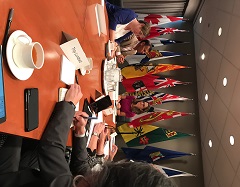The IAM welcomes the renegotiation of NAFTA. It is the opportunity to protect Canadian jobs and public services.
For one, the current federal government is including union and Labour stakeholders in the renegotiation process. IAM Chief of Staff Gord Falconer and Research Director for Canada Aurélie Sarrabezolles took part in the first meeting between Minister of Foreign Affairs Chrystia Freeland and Labour on August 15 in Toronto. It was the opportunity for the IAM to share directly with the minister our concerns and make sure NAFTA #2 benefit working people in the long run.
NAFTA had disastrous sequences on the Canadian workforce. It has undermined secure, well-paid employment and devastated manufacturing and processing industries, and the communities that depend on them. Canadian workers from the manufacturing sector suffered a great deal in the 1990s with the closures of 19% of the manufacturing plants between 1988 and 1995. The machinery sector which the IAM represented was severely impacted. By the end of the decade manufacturing employment was 6% below its 1989 level. Unemployment averaged 9.6% compared to the US rate of 5.8%. This level had not been seen since the 1930s.
We urge the government to improve the current version of the agreement by:
- Including provisions recognizing and protecting the right to collective bargaining;
- Strengthening human rights as part of a real progressive trade policy approach;
- Protecting the Aerospace sector;
- Eliminating the dispute mechanism in NAFTA that grants special rights to foreign investors and allows corporations to sue governments under Chapter 11;
- Protecting existing and new public services;
- Promoting “Buy union” provisions. The IAM strongly believes that the “Buy Canadian” versus “Buy American” approach should be changed into “Buy union” where value-added jobs and sectors are recognized and protected in the entire NAFTA region.



